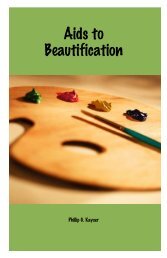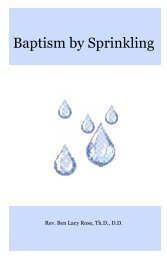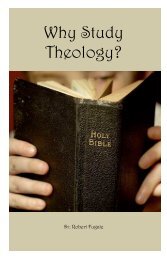"Has God Indeed Said?" - Biblical Blueprints
"Has God Indeed Said?" - Biblical Blueprints
"Has God Indeed Said?" - Biblical Blueprints
Create successful ePaper yourself
Turn your PDF publications into a flip-book with our unique Google optimized e-Paper software.
4 • <strong>Has</strong> <strong>God</strong> <strong>Indeed</strong> <strong>Said</strong>?<br />
position (underlying the "King-James-only" faction) have<br />
ignored either some or all of the Scripture’s self-referential<br />
statements on preservation. 5<br />
The Two Primary Egyptian Texts<br />
The question naturally arises that if there are so many<br />
differences among Egyptian texts, how do modern versions<br />
determine which "Egyptian" reading is correct? Though this is an<br />
oversimplification, it is generally true to say that the editors of<br />
these versions trust the expertise of five liberals who voted on<br />
each reading and then printed the results in the United Bible<br />
Society Greek New Testament. If all five agreed, the reading was<br />
given an A rating. If four agreed, it was given a B rating, if three<br />
agreed it was given a C rating. Though there are rules of textual<br />
criticism covering internal and external evidence, it is obvious<br />
from Bruce M. Metzger’s commentary on their proceedings 6 that<br />
the decisions were usually based on subjective criteria. Even<br />
their use of external evidence is troubling since they usually gave<br />
primary weight to one Greek manuscript (B, known as<br />
Vaticanus) even when every other Egyptian and Byzantine<br />
manuscript supported a different reading. Though there are 5,262<br />
Greek manuscripts currently extant, and tens of thousands of<br />
early versions, the following manuscripts carried the most<br />
weight in the UBS Text: 7<br />
• 90% of the time these editors based their reading on the<br />
primary weight of only one Greek manuscript: Vaticanus<br />
(B). In practical terms, this manuscript is the authority.<br />
• Another 7% of the time their disagreement with the Majority<br />
Text is based on a reading from Sinaiticus (a). We have<br />
already seen that Sinaiticus disagrees with Vaticanus well<br />
5<br />
See the discussion of the eleven <strong>Biblical</strong> presuppositions that should guide<br />
textual criticism, below.<br />
6<br />
Bruce Metzger, A Textual Commentary on the Greek New Testament<br />
(London: United Bible Society, 1971). See previous footnote.<br />
7<br />
This was brought to my attention by Floyd Nolan Jones, PhD, Which Version<br />
is the Bible (The Woodlands, TX: KingWord Press, 1999).






